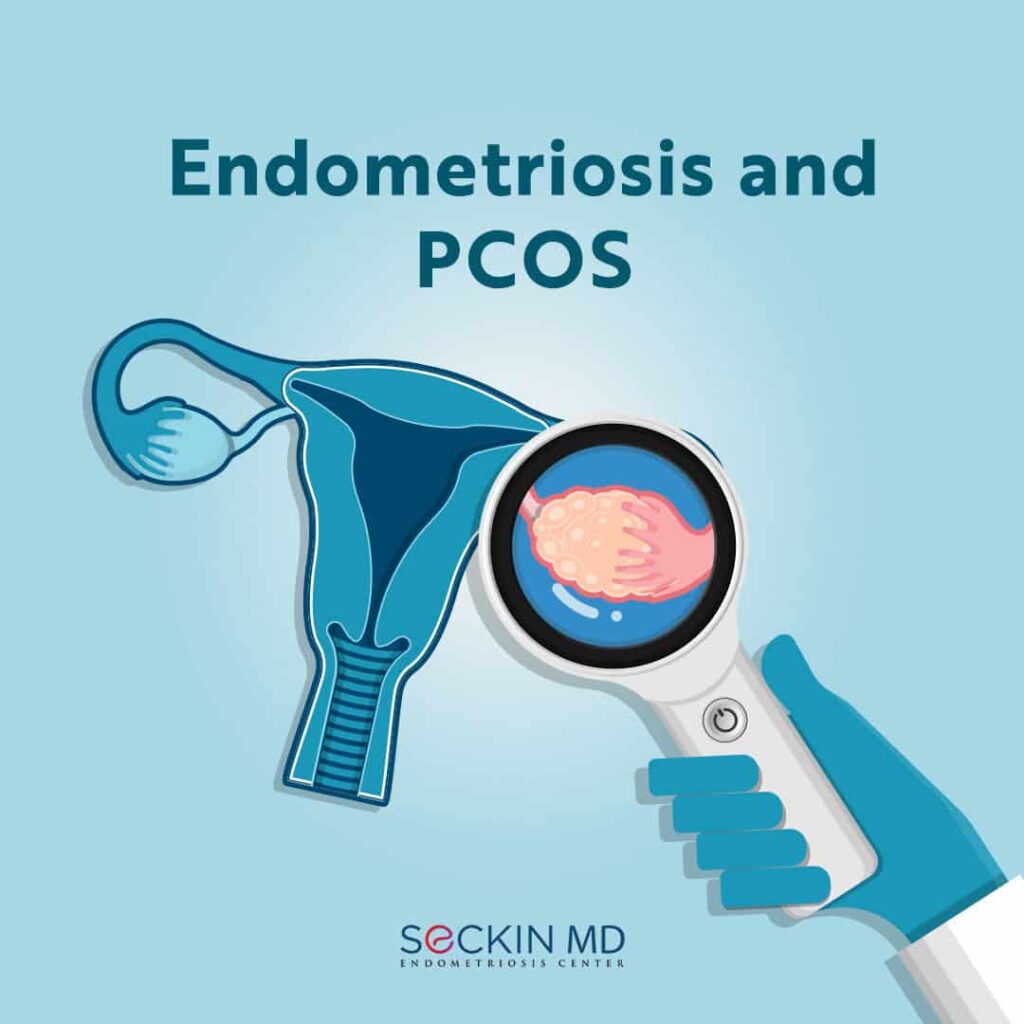Endometriosis and PCOS

Endometriosis and polycystic ovary syndrome (PCOS) each affect around 10% of women of reproductive age, greatly reducing their overall quality of life. Both conditions can have overlapping symptoms and occur together. They can, therefore, be difficult to diagnose.
What is PCOS?
PCOS is characterized by the formation multiple fluid-filled follicles (containing eggs) in the ovaries which sometimes results in aberrant menstrual cycles due to hormonal dysregulation . The exact cause of PCOS is not clear. However, excess insulin leading to increased androgen production and inflammation within the ovaries is a major characteristic of the condition. There may also be genetic factors that contribute to the development of PCOS.
How are PCOS symptoms different from those of endometriosis?
Endometriosis symptoms include chronic pelvic pain, dysmenorrhea (painful periods), abnormal bleeding (including clots with menstrual bleeding), painful intercourse, painful bowel movements, and abdominal bloating. These symptoms often coincide with the onset of menstruation and their severity does not always correlate with disease staging.
PCOS symptoms include irregular or infrequent periods, hirsutism (excess hair growth), scalp hair loss, discolored skin patches in the armpits or under the breasts (acanthosis nigricans), and oily skin that is susceptible to acne. However, women with PCOS can also experience menorrhagia (heavy periods) and dysmenorrhea similar to endometriosis, which may at times complicate the diagnosis. Finally, PCOS may also result in pelvic pain and also manifest as a pelvic inflammatory disease similar to endometriosis.
Both endometriosis and PCOS may independently be causes for infertility. In the case of PCOS, this is mainly due to hormonal changes. In endometriosis, on the other hand, physical distortions of the reproductive tract due to endometrial lesions can also contribute to infertility.
Can the two conditions be present together?
Several studies showed that the two conditions can co-exist. Though the etiologies of the two conditions are different, a significant number of women with PCOS may also have unrecognized endometriosis.
Research has suggested that increased inflammation and high androgen and insulin levels in PCOS can increase the risk of endometriosis. A 2014 study found that a good number of stage I and stage II endometriosis lesions co-exist in women with a confirmed diagnosis of PCOS. Another study showed that women with PCOS were more often hospitalized for other gynecological conditions. They also were at a significantly higher risk of also having endometriosis.
How are they diagnosed?
The diagnosis of PCOS is easier than that of endometriosis. It usually involves a pelvic exam and ultrasound scan of the ovaries along with blood tests to determine the levels of androgen and other hormones. Patients can be diagnosed with PCOS if meeting two out of three of the “Rotterdam Criteria”: Irregular/infrequent menstrual periods or absence of a menstrual period, evidence of high testosterone (either on a lab test or by evidence of excess body hair on a clinical exam), or evidence of polycystic ovaries on ultrasound examination.
Endometriosis diagnosis, on the other hand, is more complex and requires several imaging techniques and physical examinations. Definitive diagnosis is only possible by laparoscopically excising a lesion and sending it for histological analysis.
Is the treatment for endometriosis and PCOS different?
The treatment for PCOS primarily includes lifestyle changes to reduce body weight and medications such as combination birth control pills or progestin therapy. Your doctor may also prescribe medications to help you ovulate and control androgenic effects.
For effective treatment of endometriosis, laparoscopic deep excision surgery is the gold standard. Complete excision of all kinds of lesions and scarring without affecting surrounding healthy tissue is of utmost importance to prevent infertility. Unlike PCOS, the use of combined oral contraceptives can actually worsen endometriosis symptoms in some patients due to estrogen dominance.
The multidisciplinary team at Seckin Endometriosis Center has years of expertise in dealing with endometriosis and PCOS. We can ably suggest the best treatment option based on your requirements.
Do you have endometriosis and PCOS? Please do not hesitate to share your story by leaving a comment on our post on Facebook or Instagram.
Get a Second Opinion
Our endometriosis specialists are dedicated to providing patients with expert care. Whether you have been diagnosed or are looking to find a doctor, they are ready to help.Our office is located on 872 Fifth Avenue New York, NY 10065.
You may call us at (646) 960-3080 or have your case reviewed by clicking here.